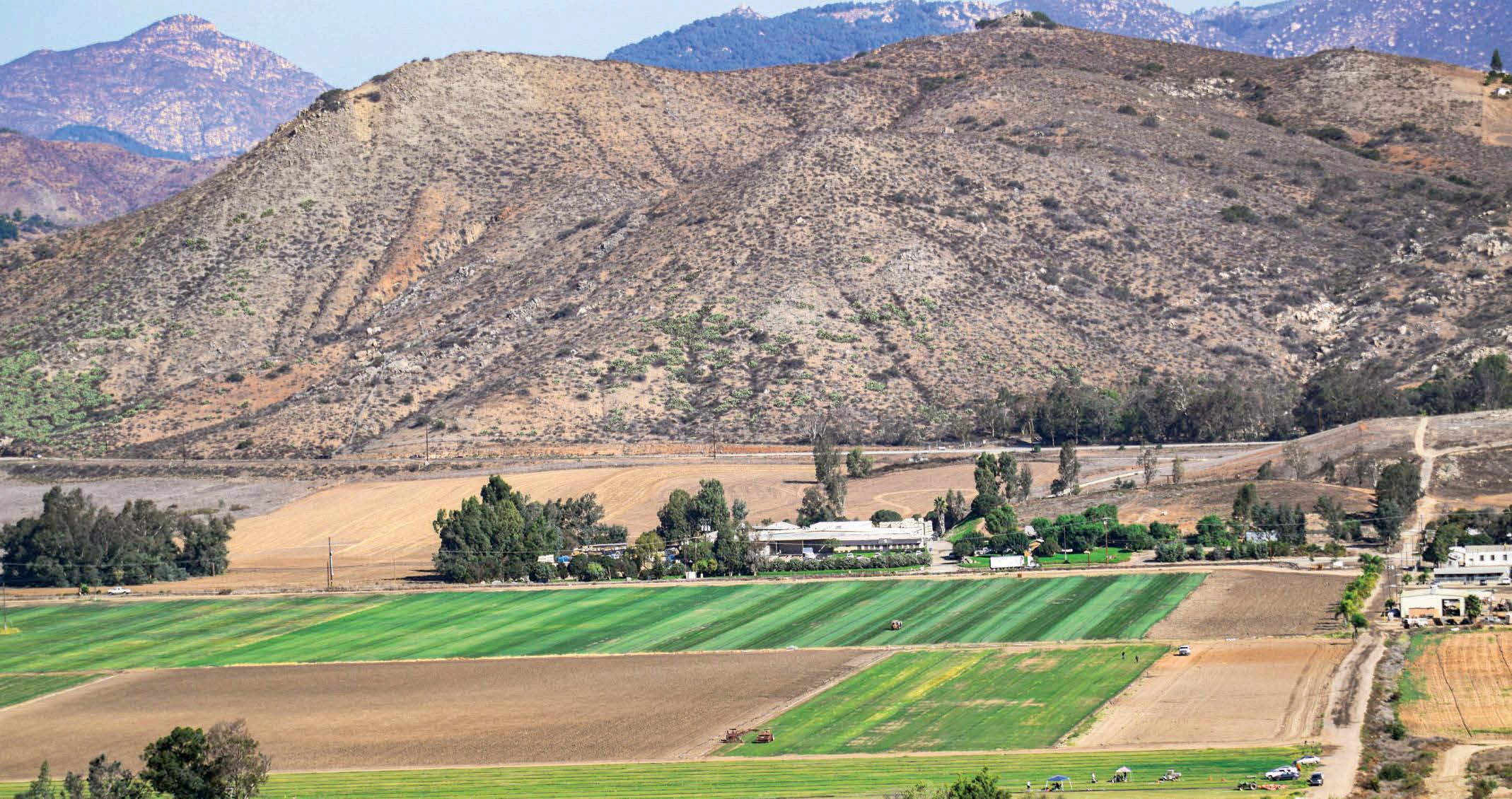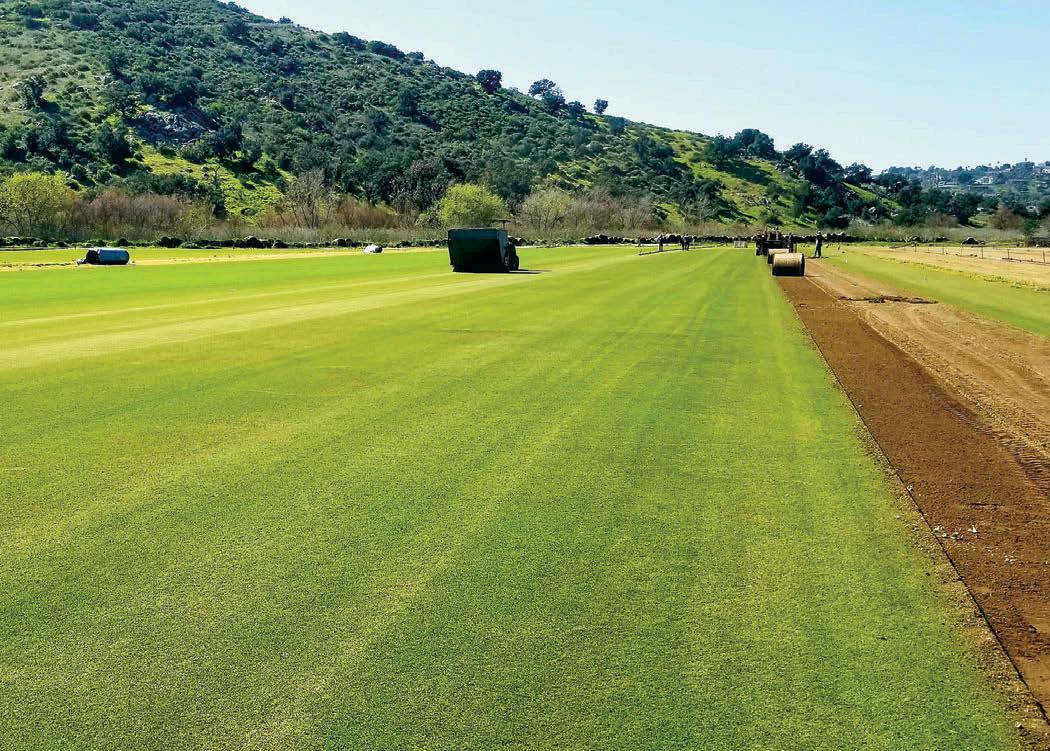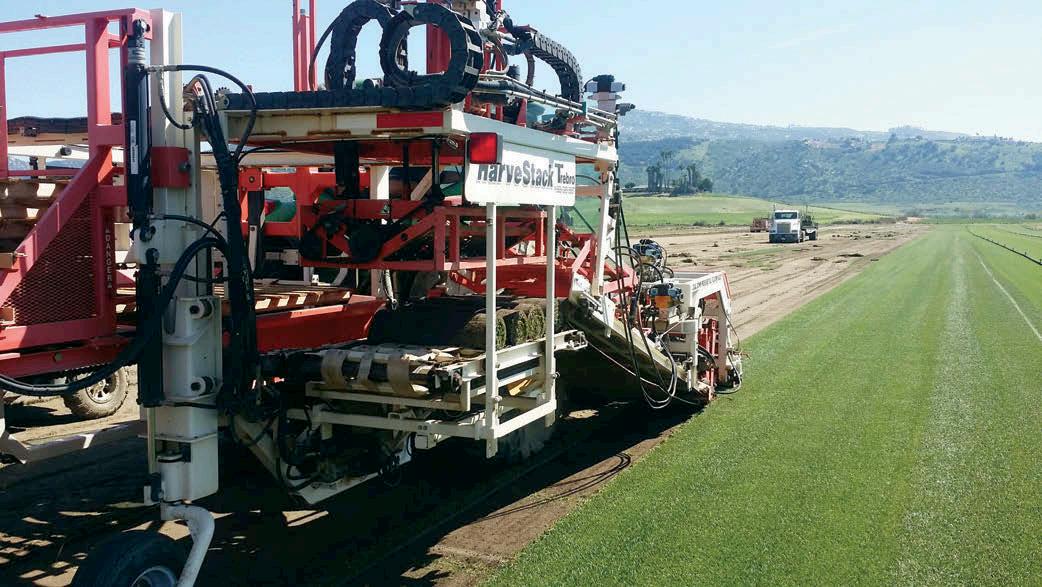
12 minute read
Meet the Field Day Host—American Sod Farms
MEET THE FIELD DAY HOST—
AMERICAN SOD FARMS
By Suz Trusty
American Sod Farms, TPI’s 2022 Field Day Host, lies within the San Pasqual Valley Agricultural Preserve.
Attendees of TPI’s 2022 International Education Conference & Field Day in San Diego, California, on February 14 to 17, are in for a treat. Weather is typically sunny, with an average of only four rainy days during the month. Temperatures are generally mild, with highs of 65 degrees F and lows of 51 degrees. And there’s so much more. You’ll have an even warmer welcome from Field Day host, American Sod Farms as partners JR Wirthlin, Jeff Nettleton, and Jimmy Fox, and their entire staff have a great day in store for you. As Fox reports, San Diego is a vacation destination for people from all over the world. “We have everything from ocean views to desert to mountains all within about 15 miles of the coast. It provides a wonderful opportunity for visitors to experience the diversity of climate and culture. Downtown San Diego reflects the wide diversity of the people who have settled here, too, with influences of the Mexican and Italian heritages and much more. It’s a cultural melting pot, a neat place to be in business.” Attendees will experience a snippet of that varied topography on the short trip from Coronado Bay to the Field Day site. American Sod Farms is located near Escondido in the San Pasqual Valley Agricultural Preserve that was established by San Diego County in 1964. Fox says, “As you drive into the valley, you will see other crops in production such as strawberries, citrus, and avocado. The San Diego Zoo Safari Park (named the San Diego Wild Animal Park until 2010) is an 1,800-acre zoo nearby.”
In the Beginning
As the company website, www.americansodfarms.com, shares in their “About” section, “American Sod Farms has a forty-year legacy in Southern California. Started in 1978 by Lieutenant Colonel Floyd Wirthlin, Sr., American Sod started off serving homeowners and contractors in the San Diego area. During the height of the housing boom, Floyd and his son, Floyd, Jr. (who goes by JR) operated farms in Escondido, South Bay, and Barstow, serving Southern California and Las Vegas with beautiful sod.” It further notes, “American Sod has always grown stunning tall fescue sod, leading Home Depot to choose them as their main supplier in the booming San Diego market. As the farms grew, and the demand grew, American Sod began growing other types of grasses. They introduced Aloha Paspalum to the market, expanded their St. Augustine acres, and brought in Tifway 419 and Tifgreen 328 for golf courses and sports fields.” At that point, the boom was in full swing, and the company was typically running 20 semitrucks a day. Their
primary market was residential, with approximately 80 percent of that business going through Home Depot and Lowe’s. California was the largest tall fescue market in the world and, though American Sod was offering multiple grasses, their production was 90 percent tall fescue. Then the economic downturn of 2008 hit which, in California, was combined with an extreme and extended drought. The culture changed too, with population growth and increasing water demands throughout the state. It all prompted the attack on grass as a heavy water user with restrictions placed on the amount of area that could be planted in grass and restrictions on using water for those grasses. Like so many others, American Sod cut their production, their acreage, and their staff to adjust to the changing market. And, also like so many others, as economic conditions gradually improved, the company gradually and cautiously ramped back up.
Teaming Up
In 2016, AmSod as it was called then, teamed up with Evergreen Turf, a sports and golf oriented sod operation, to bring new varieties and technologies to SoCal. Fox says, “The last big drought was finally winding down in 2016, but we could see the writing on the wall. People were more water conscious and were making decisions that took the available natural resources into account. We needed to adapt by growing the grasses that met the demand to help conserve water. So we would need to diversify by adding more of the warm-season grasses. We also needed to broaden our customer base so that, hopefully, we can be prepared for future challenges, whether they are weather-related or tied to economic conditions. We also rebranded the name of the farm to its original name, American Sod Farms.” Diversifying also presented some challenges. He reports there are 18 different climates within their marketing area so just determining the best grasses to grow to meet the needs of all of them was in interesting process. The Escondido farm is 250 acres, with 225 acres of that devoted to sod production. They have an additional 150 acres in production at a different farm site. They harvest both small rolls and big rolls. And, Fox says, “Bringing in the warm-season grasses changed how we grow, how we mow, and how we harvest.” Changing the grass mix has been a gradual process. They now grow 60 percent coolseason grasses and 40 percent warm-season grasses. They plan to bring that breakdown to 50/50 in 2022. Fox notes most of TPI’s Field Days held in the winter have been on warm-season grasses. He says, “We will be hosting the Field Day on a tall fescue field. Sod producers from the north will be able to watch the harvesters and mowers operating on the grasses they’re used to working with. We are glad to have the opportunity to host and are really looking forward to having everyone here.” On staffing, he reports they bring in quite a few H2A workers during the summer when their season high ranges between 30 and 35 people. “Our winter crew is smaller, mainly the office staff, truck drivers, and some field personnel. We’ll be about 20 or so by Field Day.” Most of the trucking is handled in-house. He says, “We’re usually running three to five trucks a day from the Escondido farm, depending on the season. We’ll hire trucks and drivers for the larger projects that need an additional six or eight truckloads.”
Serving the Diverse Market
The outreach to other customer categories has been ongoing, evolving a bit each year after 2016. Fox says, “American Sod Farms’ customer base is now about onethird box stores and residential, one-third landscape contractors, and one third golf courses and athletic fields, with the higher percentage of that third the golf courses.” The website lists multiple services: sod installation, hand planting, mechanical planting, hydroseeding, turf and sod removal, consultation, and custom grown sod. While Fox reports they can and do provide all of those, some are only requested occasionally, and their growing relationship with the contractor market has shifted some of those services to others. He says, “We do limited removal, basically on athletic fields. We’re primarily delivery, with most of our installation focused on the larger projects.” Fox adds, “Those 18 different climates make it more difficult for our customers to determine the right grass for their site. That choice needs to be based on the climate, the type and amount of use the grass will have, and the level of maintenance it will receive. Frequently the warm-season grasses are the best option, but sometimes a cool-season grass is the right choice. We believe it’s our job to help them make the right decision and we’re dedicated to making that happen.”

American Sod Farm crews are mowing and vacuuming the fields in preparation for harvesting the sod for the Los Angeles Football Club and Petco Park.
A Few of Their High-Profile Projects
American Sod Farms work with high-profile sites also increases their visibility throughout their marketing area and has helped them grow and diversify. The team’s first high-profile project together was installing Latitude 36 bermudagrass in the Banc of California Stadium. That soccer-specific stadium was built in the Exposition Park neighborhood of Los Angeles, California, on the former site of Los Angeles Memorial Sports Arena. It is the home of Major League Soccer's Los Angeles FC and future home of the National Women's Soccer League's Angel City FC. The success story continues. Torrey Pines Golf Course in nearby La Jolla chose to use Latitude 36 as it prepared to host the 2021 U.S. Open Championship. Petco Park, home of Major League Baseball’s San Diego Padres, also chose Latitude 36.
One of the grasses they chose to introduce to their market for its drought tolerance was TifTuf hybrid bermudagrasses. As the website reports, “Initial testing at UC Riverside has shown that it is not only drought tolerant, but holds its color deep into the winter …” “TifTuf was recently installed on the soccer fields for the city of San Diego and has already outperformed all other grasses.” Bermuda is not the only warm-season grass making an impact. As the website reports, “… the city of Coronado recently tested American Sod's Aloha Paspalum. The June Gloom and high salt irrigation water made it hard to grow great grass in their parks. After a year of testing, Aloha was chosen to replace the grass in Sunset Park. The Park now looks beautiful, with a vibrant green field that holds up to dogs, kids, and salty water!”
Getting to Today
When Covid first hit in 2020, the management team didn’t know what to expect. Fox says, “We anticipated we might be 20 or 30 percent below our original projections. Instead, about six months in, we were 10 to 15 percent ahead. We kept that same trajectory all year, and 2021 has been up again, even over 2020. In 2021, the farm was fully planted the first time in five years. We’re now short on space and don’t have room to grow anything other than sod. But we think sod is the best crop we could have, so we’re okay with that.” The American Sod Farm staff manages all the sales and deliveries. JR is the main manager overseeing the growing of the grasses and the harvesting. Fox says, “JR is an icon in San Diego’s natural grass industry, well known, well liked and highly respected.”
Serving the Market Online
American Sod Farms’ website was developed to meet the growing preference by customers everywhere for online shopping. It’s a user-friendly site that is set up to assist customers in selecting the right grass for their needs within the region’s climatic diversity by guiding them through the process with step-by-step questions. Two categories of customers are listed on the website home page: Professional and Residential. Clicking on the “Professional” heading leads to a page titled, “Commercial Sod Services,” and provides the complete listing of services offered. Next comes this copy, “Putting the finishing touches on your vision and design is not a task taken lightly. Construction and renovation projects require the finesse and professionalism that can only be perfected by experience. Over the years, American Sod Farms has assembled a team of some of the most experienced and knowledgeable people in the industry, helping establish us as California's premier sod and grassing contractor. We are committed to quality product, consistency, and outstanding performance. If your project requires nothing less than perfection, choose American Sod Farms.” These categories are listed next, each in a green action bar: Sod Varieties, Golf Course Sod, Sports Field Sod, Contractors, and Credit Application. Clicking on the “Residential” heading leads to a page that starts off with these statements, “American Sod Farms produces only the finest sod grass varieties. We harvest your sod from our local California farms when you order, ensuring that the freshest and best quality grass arrives at your home.” And closes with this, “Every yard is different, and we have tried to make selecting the right variety for you as easy as possible. Please visit our sod grass varieties page to help find the right California sod for your new lawn.”

Opening Day at Petco Park in downtown San Diego, home of MLB’s San Diego Padres. American Sod Farms provided the sod.

Harvesting is underway at American Sod Farms.
Under the Sod Varieties action bar is a listing of each grass type offered for that category of customer. A paragraph about each individual grass variety, or grass blend or mixture, recommended for that market is followed by a close-up photo of it and a photo of it in an appropriate setting, with a chart below that describes each of the following characteristics: Texture, Color, Damage recovery, Shade tolerance, Salinity tolerance, Drought tolerance, Mowing height, and Recommended mower type. Armed with this information, a potential customer browsing the website could opt to “Order Now,” check out the “Lawn Selecter Tool,” review the information provided on multiple topics under the Lawn Care heading, or ask a question via email or phone. The Lawn Selector Tool is also designed to encourage online action. It shows up in multiple places, including on the “About Us” page. Those using the tool are guided stepby-step through a series of questions that lead them to the appropriate recommendations page. That page also offers action bars for the following options: “How to order,” “How to measure,” and “How to Install.”
The “About Us” page even features a box promoting “Seasonal Lawn Care Tips: We’ll remind you when it’s time to reseed and change your irrigation schedule.” Of course, it includes an action bar to “subscribe.” There also are icons to connect via Twitter and Facebook.
Family Tradition
The entire operation is focused on customer service, fulfilling the statement on their website, “American Sod Farms; family tradition with local knowledge and global technology. We have the right grass for your Southern California backyard, sports field, or golf course!” Today, Floyd Sr's grandkids also work in the business, along with JR, carrying on their Grandpa's tradition of a manicured farm, and a well-run business. Floyd Sr.'s dedication to our country has also carried on as the company offers discounts to veterans in appreciation of their service to America.
Suz Trusty is co-editor of Turf News. All photos courtesy of American Sod Farms.















